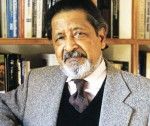Nobel Laureate Discusses African Spirituality

On Friday, October 15, writer V.S. Naipaul, winner of the 2001 Nobel Prize in Literature took part in the Living Writers series. Naipaul read from his latest book The Masque of Africa: Glimpses of African Belief to an audience assembled in Love Auditorium and also took part in a separate discussion with students taking the Living Writers class.
In his non-fiction work The Masque of Africa, Naipaul explores “the nature of African belief ” in the style of a travelogue, reporting on his recent journeys among the African people. In the passage that he read to a near-capacity crowd in Love Auditorium, Naipaul described a conversation he had with a native he met in the Sub-Saharan nation of Gabon concerning the man’s spirituality.
“I am interested in earth religions,” Naipaul said to an open forum of the Living Writers class that was streamed live on the Colgate website. “These are the religions that take you back to the beginning of things … They are rough, crude.”
The native man with whom Naipaul talked held primal beliefs as opposed to those of the modern religions in Africa, such as Christianity and Islam. His religion was one of the “forest,” inspired by Gabon’s grand, lush rainforests. Naipaul took a special interest in this man’s belief in an “energy” that gave the forest its divine element. The man’s belief in this energy inspired him to devise ritual paths through the dense forest underbrush and offer tribute to past ancestors by placing forest foods soaked in rum on their graves. Rites of initiation under this system of tribal belief included smearing boys in bananas as they reached sexual maturity in a secret ritual.
“I was dazzled by this man,” Naipaul told the Living Writers class. “He spoke clearly as a believer.”
Naipaul is best known as a novelist. Among his most famous works are A House for Mr. Biswas, A Bend in the River and Miguel Street. In addition to winning the Nobel Prize for Literature in 2001, Naipaul also received the Booker Prize in 1971 and a knighthood from the Queen of England for services to literature in 1990.
Naipaul was born in Trinidad in 1932. He received a scholarship to Oxford in 1950 and has lived primarily in England ever since. His upbringing in the Caribbean has made him one of the region’s most prominent voices. He has also traveled widely and these travels have provided the inspiration for much of his writing.
One such book inspired by his travels is his seminal novel A Bend in the River, which takes place in the nation of Burundi in Africa and was read by students in the Living Writers course. In their discussion with Naipaul on the book, the class was joined by President Herbst, whose interview with Mr. Naipaul was filmed and streamed live on the Colgate website.
An important topic of discussion was the seminal opening lines to that novel: “The world is what it is; men who are nothing, who allow themselves to become nothing have no place in it.” President Herbst, a scholar of African socio-economics, saw in these words a feeling for Africa’s strivings as a continent. Naipaul disagreed.
“I thought purely of the narrator,” Naipaul said. “He is a man who through a sentimental connection with the Africa he finds comes upon a fulfillment of heart.”
Naipaul, known more for his connection to the Caribbean, instead explores the idea of place in the continent of Africa, a destination he has visited frequently. Indeed, Colgate students responded to this with their own sense of place.
“I was really excited to hear V. S. Naipaul was visiting Colgate for the Living Writers series,” sophomore and Trinidadian native Andrew Hoadley said. “As Trinidad’s only Nobel Laureate, Sir Naipaul sparked quite a bit of nostalgia for my home … It was also very strange to think that here I was, thousands of miles away from home, and I’m getting to meet one of my nation’s greatest heroes for the first time. I once again thanked my lucky stars for finding myself at Colgate.”
Naipaul left his audience at the reading with a sad and poignant final image. In response to an audience member’s question, this globally minded speaker described what he believes to be a great tragedy in contemporary Africa.
“I feel a great sadness that nations like Gabon are losing the forest,” Naipaul said. “You see a great tree chopped down, sitting in a truck driving away. You feel that a soul has been taken away with it.”



